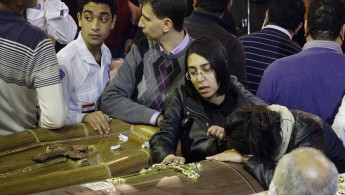Egyptian Christians bury dead after IS church bombings
Egyptian Christians are burying their dead a day after at least 44 people were killed in twin suicide bombings at Palm Sunday services in two separate cities.
Women wailed as caskets marked with the word “martyr” were brought into the Mar Amina church in the coastal city of Alexandria on Monday, the footage broadcast on several Egyptian channels.
Coptic priests, boy scouts, and mourners carrying flowers joined a procession into the church, the pace set by a beat of snare drums.
At least 17 people were killed at St. Mark’s Cathedral in Alexandria, the historic seat of Christendom in Egypt. Another suicide attack killed at least 27 people inside St. George’s Church in the Nile Delta city of Tanta.
Egyptian Christians are furious at the Sisi-led Egyptian state, which they believe will no longer protect them.
At Tanta University hospital morgue, reported Reuters, desperate families were trying to get inside to search for loved ones. Security forces held them back to stop overcrowding, enraging the crowd.
"Why are you preventing us from entering now? Where were you when all this happened?" shouted one women looking for a relative. Some appeared in total shock, their faces pale and unmoving. Others wept openly as women wailed in mourning.
Hours after the attack, Kerols Paheg and other young Coptic Christians were already digging graves in the basement of the devastated St. George Church in the northern Nile Delta city, where the first of the bombs exploded, killing 27 and wounding around 80.
He showed Reuters photos on his phone of the carnage: human remains, blood and shattered glass strewn across the floor of the church on one of the holiest days in the Christian calendar. "Today was supposed to be a day of festivity," he said.
From now on, Christians will have to protect their churches themselves, rather than rely on the police, "because what's happening is too much. It's unacceptable," he said.
Copts make up about 10 percent of Egypt's 92 million people, the largest Christian minority in the Middle East. Yet despite a presence dating back to the Roman era, the community feels increasingly ostracised and has repeatedly been targeted in attacks, including by the Islamic State group, which claimed responsibility for Sunday's bombings.





 Follow the Middle East's top stories in English at The New Arab on Google News
Follow the Middle East's top stories in English at The New Arab on Google News


